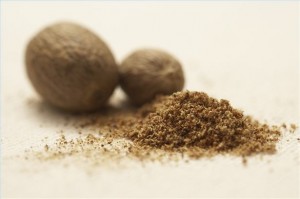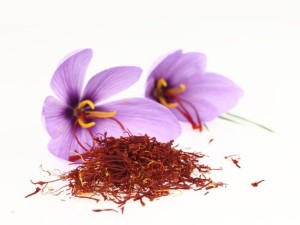Cinnamon, nutmeg, pepper, saffron…Spices give a unique aroma and taste in our food. Recent studies show that they have really important benefits for our health, as well. Their ingredients seem to prevent us from diabetes, cardiovascular diseases, stroke, as well as many types of cancer. Today, researchers internationally – from India to America and from Norway to Spain – study the effect of spices in our health. However, the downside of most studies is that they have taken place in the lab or on guinea pigs. Therefore, while we wait for more studies on humans, we searched for the most important scientific data that confirm what our ancestors already knew: apart from making our dishes tastier, spices also make us healthier and they are extensively used in the Mediterranean Diet.
Spices mostly come from the dried parts of plants, such as the buds (e.g. Clove), the skin (e.g. cinnamon), the roots (e.g. turmeric) and the seeds (e.g. mustard, coriander, anise).
The health benefits of spices
Anti-cancer attributes
More and more studies show that spices have anticancer properties. More specific, cumin, clove, allspice, mustard seeds and saffron are attributed significant antimicrobial and anticancer properties. Even though more research is needed, it is considered a fact that some substances found in spices (carotenoids, curcumin, catechins) have the ability to suspend the multiplication of cancer cells.
Antimicrobial “weapons”
Cinnamon, cumin, mustard seeds, coriander, nutmeg, cardamom and pepper (black and white) are the spices with the strongest antimicrobial and antiseptic action, according to a list formed by biologists of Cornell University in New York (starting from the stronger antimicrobial spices and going to the less powerful ones). Moreover, an Indian research, studied the ability of 35 different spices and herbs to neutralize pathogens (such as E.coli, Subtilis bacillus and Saccharomyces Cerevisiae). Cinnamon, clove, cumin and nutmeg emerged as the most bactericidal.
Rich in antioxidants
Norwegian and Japanese scientists studied the concentration of antioxidant substances in spices, such as clove, allspice and cinnamon, as well as some herbs. In the conclusions of their study, the researchers stress the fact that the use of spices and aromatic herbs could potentially be a source of antioxidants comparable to fruits and vegetables.
“Pluripotent” and digestive
Today there are enough scientific evidence for the beneficial action of certain spices , such as cinnamon and nutmeg , in type 2 diabetes . Moreover, many spices are studied for their anti-inflammatory and analgesic action (e.g. cloves) . Although investigations are in their early stages, one thing is certain: that incorporating spices in your cooking, has many benefits for our health, both direct – from the spices themselves – and indirect – because they help us reduce salt and fat consumption. Also, many spices – like cumin, anise and fennel seed – facilitate digestion. On the other hand, however, certain spices (such as curry) can irritate our stomach when ingested beyond measure.
Research findings about…
…cinnamon
There are many interesting studies about the anti-diabetic effect of cinnamon. Cinnamon seems to trigger insulin secretion in animals. Moreover, it has been shown to reduce glucose levels in type 2 diabetes patients, who were also taking anti-diabetic drugs. It is however still expected to be clarified how strong is the anti-diabetic effect of cinnamon and how it can be useful in dealing with this disease. Cinnamon has been introduced in the Eastern Mediterranean cuisine and over the years it has spread in the diet of all Mediterranean countries.
…turmeric
Turmeric is considered to be a versatile “medicine”, mainly due to and ingredient it contains, called curcumin, which is responsible for its yellow-orange color.
- Curcumin is a powerful antioxidant and is considered to have anti-inflammatory and anticancer properties. It is believed that it can help in the treatment of cancer, diabetes, cardiovascular disease, arthritis and Alzheimer’s disease.
- Curcumin consumption is associated with reduced risk for some types of cancer, such as colon and prostate cancer.
- In addition, a Canadian study suggests that it contributes in vascular healing after heart attacks, while its possible protective effect in the prevention of stroke is still studied.
…pepper
Pepper is considered to be one of the strongest spices, regarding its antioxidant and anti-inflammatory properties, according to a recent study published in “Journal of Medicinal Food”. In the study 24 different spices and herbs, which are used in cooking, were examined. Black pepper was found to be extremely rich in antioxidants (phenols) with anti-diabetic action; due to a mechanism which preserves the glycosylation of proteins (a process in which glucose is bonded to the molecules of proteins and destroys the tissues of the body).
…nutmeg
Nutmeg has undoubtedly a really strong antioxidant effect and is known to eliminate stomach pathogens, while studies in animals suggest it has antidepressant action. Moreover, a few years ago, Indian researchers studied (in animals) the relation of nutmeg and diabetes and found that it contributes in lowering blood glucose levels, as well as improving blood lipids. Nutmeg, however, should not be consumed in large amounts – up to 3gr. per day – because it is hallucinogenic and toxic.
…curry
Today there are studies correlating curry consumption (nine spice mixture) with various health benefits, mostly because of the curcumin it contains.
- Curry is considered to be a natural source of salicylic acid – which is like aspirin, in small doses! Indeed, it is interesting that in India – a country with large curry consumption and small cancer rates – the concentration of salicylic acid in the blood of Indians is four times higher compared to the English. Today scientists investigate how curry consumption, as well as other spices or aromatic herbs containing salicylic acid (oregano, thyme, paprika), prevent certain types of cancer.
- Moreover, according to studies (in animals) from Italy, America and Canada, curry has been associated with protection from degenerative brain diseases, reduced risk of heart attack, positive effects on rheumatoid arthritis and anticancer effects.
…saffron
Traditionally, saffron is considered to be tonic, sedative, anti-thrombotic and aphrodisiac. According to scientific review, the anticancer effect of saffron has been shown in studies, but not in humans. Its antidepressant effect, however, has been proved both in laboratory research and in small clinical trials. It is being cultivated in some Mediterranean countries and it is used in the Mediterranean diet.
…cumin
Cumin is considered one of the top spices used in Mediterranean cuisine, regarding its antioxidant power and protection of food from oxidation. This is why it is been studied whether it can be used as a natural food preservative.
…clove
Clove – like cinnamon – is becoming a “champion” among spices, regarding its anti- diabetic action.
- Additionally, dentists have been using for years eugenol – the essential oil of clove – as a analgesic, anti-inflammatory and antimicrobial agent.
- However, there have been no clinical trials to prove the other properties attributed to clove, such as the treatment of inflammation. As for its anti-fever activity, it has been studied and shown in animals.
…allspice
Allspice comes right after clove regarding its antioxidant content. Moreover, it is believed to reduce blood pressure, but there isn’t sufficient research to back up this action.
The encouraging data of scientific research don’t mean we should increase spice consumption beyond the doses recommended in recipes, given that over-consumption can have adverse effects, e.g. digestive discomfort or even toxic effects, as certain spices, such as nutmeg, are toxic in large doses. Also, don’t forget that a lot of the beneficial effects of spices are still under investigation and, of course, don’t substitute your medication.
















{ 0 comments… add one now }